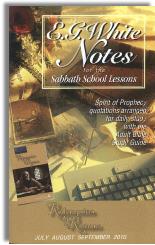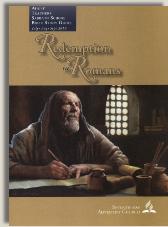|
||||||||||||||
Commentary on "All Have Sinned"
Day 1: Sabbath Afternoon, July 10, 2010 - Introduction
Overview
The introductory lesson for this week starts by speaking in very orthodox language about the sinfulness of humanity and the sinner’s need to see and acknowledge his depraved state as a necessary requirement paving the way for God’s gospel. This is a positive point of view, of course, since the gospel is a solution for a specific problem, God’s solution for man’s sin. A sinner will reject God’s gospel as long as he’s not dealing with and acknowledging his sin.
Observations
Still, it is not clear at all what the role and significance of man’s sinful state are after he has come to a saving knowledge of Christ and the gospel. It is not clear if Romans 1-3, on which this week’s lesson is built, applies only to the unconverted, unregenerated state of the sinner, or if this predicament bears some significance after conversion. This question is raised because if the role of works in salvation before conversion is rejected, there is a change in the Adventist position about the role of works after conversion—works that, in the peculiar Adventist theological construct of the investigative judgment, bear a significant role in the final acquittal and cleansing of sin from the record book of the heavenly sanctuary.
Two quotes from Ellen White are offered which affirm that works cannot “liquidate the debt of his transgression.” That’s a positive assessment of the situation, but it falls short of an adequate and thorough dealing with the role of works. If the debt cannot be liquidated by works and only by Jesus Christ’ sacrifice, it follows that humans have no hand in their salvation, and the entire price for our sins was paid by Christ in his death. His grace to us was bought entirely by somebody other than the sinner.
Still, Adventists have a long history of opposition to the gospel that affirms that justification is exclusively forensic. Moreover, while justification is always connected to sanctification, God’s grace excludes any mixing of the two to the degree that justification is in no way, shape, or form dependent on sanctification. The case of Desmond Ford is revealing about this question, Adventists officially classify the gospel of justification by faith alone as “cheap grace.” By “cheap” they can’t mean and obviously don’t mean that Christ’s sacrifice was cheap, but that we receive the benefits Christ obtained for us for free, without any cost involved. While denying that man in his sinful state can liquidate the debt of sin, denying that we can pay the price for our sin, Adventism sneaks in the payment at the level of buying the grace—buying the payment of sin—moving the target one step further and opposing the evangelical gospel of God’s free grace.
The second quotation from Ellen White looks good as it stands, isolated from the larger context of her writings. Quoting from the Bible to back up the idea that works are valueless and Christ is everything for salvation, she affirms that “Christ is able to save to the uttermost because He ever liveth to make intercession for us.”
For the present time that statement may be excellent and sufficient, but what happens with the Adventist thesis that after the closing of the investigative judgment there will be a time when the believer will have to stand before a holy God without a mediator? If Christ is able to save to the uttermost precisely because He doesn’t cease to make intercession for the believer, precisely because his intercession is not interrupted by his death as it happened with the earthly priests, how can he save those for whom he ceases to intercede? This leads to the implicit and necessary conclusion that a different message of the gospel must apply to people in that time than applies today when He’s interceding. In a sense, the Adventist church had tied its mission to the unique idea of preparing the Christian world for that time, a time without a mediator, which requires a different message, a gospel “adjusted” and updated in order to face that particular, unique, and terrible time of “after intercession.” At the same time, the question raised by this particular text quoted by Ellen is, “Does this text cease to be true at some time?” These are not petty questions; they go to the heart of Adventist worldview.
Summary
- All men are depraved and in need of a Savior.
- Humans have no hand in their salvation; Christ paid the entire price for our sins.
- Christ does save to the uttermost. Ellen’s White’s statement to this effect, however, contradicts her other statements about people standing without a mediator after the end of the investigative judgment.
- The confusion of Ellen White’s statements regarding the sufficiency of Jesus alone to effect our justification even though our sanctification is not complete in this life casts grave doubt on Adventist theology.
- If all have sinned and Jesus alone pays for our sin, how can it also be true that at some point we stand without a mediator? This “schizy” theology stems from a confused worldview and an uncertain atonement.
Copyright 2010 BibleStudiesForAdventists.com. All rights reserved. Revised July 9, 2010. This website is published by Life Assurance Ministries, Glendale, Arizona, USA, the publisher of Proclamation! Magazine. Contact email: BibleStudiesForAdventists@gmail.com.
The Sabbath School Bible Study Guide and the corresponding E.G. White Notes are published by Pacific Press Publishing Association, which is owned and operated by the Seventh-day Adventist church. The current quarter's editions are pictured above.
Official Adventist Resources
Standard Edition Study Guide Week 3
Teacher's Edition Study Guide Week 3
Easy Reading Edition Study Guide Wk 3
Search the Complete Published Ellen G. White Writings


